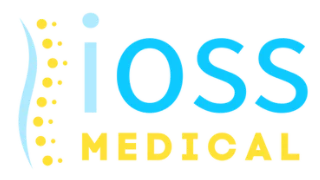Ankylosing spondylitis (AS) is a chronic inflammatory disease affecting the spine, causing pain and stiffness. At the Institute of Orthopedics, Spine, & Sports in Clifton, NJ, Dr. Calvert and his team provide non-surgical treatments to manage AS, helping patients reduce pain and improve their lives. Book your appointment today by calling (973)-922-9515.
Understanding Ankylosing Spondylitis
Ankylosing spondylitis (AS) is a type of arthritis that primarily affects the spine but can also involve other joints. It is a chronic inflammatory disease that leads to persistent pain and stiffness. Over time, the inflammation can cause the vertebrae to fuse, resulting in reduced flexibility and potentially leading to a hunched posture.
Causes
The exact cause of AS is not fully understood, but it likely involves a combination of genetic and environmental factors. Many individuals with AS possess the HLA-B27 gene, suggesting a genetic predisposition. However, not everyone with this gene develops AS, indicating that other factors, such as infections, might play a role.
Symptoms
AS manifests through a variety of symptoms that can vary in severity and progression. Common symptoms include chronic back pain, which usually begins in the lower back and buttocks and tends to worsen over time. Morning stiffness is another hallmark of AS, with stiffness being most severe in the morning or after periods of inactivity, typically improving with physical activity and exercise. As ankylosing spondylitis (AS) progresses, inflammation can lead to the fusion of vertebrae (ankylosis), reducing spinal flexibility and potentially causing a hunched posture.
The disease can also cause pain and swelling in other joints, such as the hips, shoulders, knees, and ribs, leading to decreased range of motion. Chronic inflammation and pain often result in fatigue and a general feeling of tiredness, impacting daily activities and quality of life. Additionally, up to 40% of people with AS may experience uveitis, an inflammation of the eye causing pain, redness, and blurred vision.
Involvement of the joints between the ribs and spine can lead to reduced chest expansion and difficulty breathing deeply. Some individuals may also develop inflammatory bowel disease, such as Crohn’s disease or ulcerative colitis, and inflammation of the ligaments and tendons attached to bones can cause heel pain.
Types of Ankylosing Spondylitis
- Axial Spondyloarthritis: Mainly affects the spine and sacroiliac joints, divided into Non-radiographic Axial Spondyloarthritis and Radiographic Axial Spondyloarthritis (Ankylosing Spondylitis). Non-radiographic Axial Spondyloarthritis involves inflammation without changes visible on X-rays, while Radiographic Axial Spondyloarthritis shows inflammation and structural changes on X-rays.
- Peripheral Spondyloarthritis: Affects joints in the arms and legs rather than the spine, with symptoms including pain, swelling, and stiffness in the knees, ankles, and feet.
- Enthesitis-Related Arthritis: Involves inflammation where tendons and ligaments attach to bones, causing pain and stiffness in these areas, and is more common in children and young adults.
Diagnosis
Diagnosing AS involves a combination of clinical evaluation, imaging studies, and laboratory tests. A thorough medical history and physical examination are essential, with doctors looking for patterns of pain, stiffness, and family history of AS or related diseases. Imaging studies, such as X-rays, MRI, and CT scans, are used to detect inflammation, bone erosion, and fusion in the spine and other joints.
Early signs of AS may not be visible on X-rays, making MRI particularly useful in early diagnosis. Blood tests can help detect markers of inflammation, such as elevated levels of C-reactive protein (CRP) and erythrocyte sedimentation rate (ESR). Testing for the HLA-B27 gene can support the diagnosis but is not definitive, as many people with this gene do not develop AS.
Treatment
While there is no cure for AS, treatment aims to manage symptoms, reduce inflammation, and maintain mobility. At the Institute of Orthopedics, Spine, & Sports in Clifton, NJ, Dr. Calvert and his team provide non-surgical treatments to manage AS effectively. Treatment options include medications, such as nonsteroidal anti-inflammatory drugs (NSAIDs), which are often the first line of treatment to reduce pain and inflammation.
In more severe cases, biological medications, such as TNF inhibitors and IL-17 inhibitors, may be prescribed. Physical therapy is crucial in managing AS, with tailored exercise programs designed to maintain flexibility, strength, and posture. Lifestyle modifications, such as regular exercise, maintaining a healthy weight, and avoiding smoking, can help manage symptoms and improve overall health. In some cases, assistive devices such as braces or supports may be recommended to improve posture and mobility.
Why Choose the Institute of Orthopedics, Spine, & Sports?
Dr. Calvert, founder and CEO of the Institute of Orthopedics, Spine, & Sports, leads a dedicated team offering comprehensive non-surgical treatments for various painful conditions, including ankylosing spondylitis.
- Expertise in pain management: Dr. Calvert completed an ACGME-accredited interventional pain management fellowship at Rutgers New Jersey Medical School, refining his abilities in advanced pain relief techniques and handling complex cases.
- Comprehensive training: Dr. Calvert’s residency at Temple University Hospital in the department of physical medicine & rehabilitation provided him with extensive training in diverse aspects of patient care.
- Cutting-edge treatments: At the Institute of Orthopedics, Spine, & Sports, we use the latest techniques in pain management to ensure effective treatment and optimal outcomes for our patients.
- Patient-centered care: Our approach focuses on delivering high-quality patient care tailored to each individual’s needs, ensuring a supportive and effective treatment experience.
- Advanced diagnostics: We use advanced diagnostic tools to accurately diagnose and assess the severity of ankylosing spondylitis, enabling precise treatment plans.
- Comprehensive rehabilitation: Our rehabilitation programs ensure sustained recovery, prevent relapses, and help patients return to their daily activities with improved function.
Contact Us
To make an appointment, you can call us at (973) 922-9515. Also, you can book an appointment online. If you have any queries, you can also email us at iossmedical@gmail.com.
Conclusion
Ankylosing spondylitis is a chronic inflammatory disease that can cause significant pain and disability if not managed properly. Early diagnosis and comprehensive treatment are crucial to managing symptoms, maintaining spinal mobility, and preventing complications. At the Institute of Orthopedics, Spine, & Sports in Clifton, NJ, Dr. Calvert and his team offer a range of advanced non-surgical treatments tailored to each patient’s needs.
With a strong commitment to delivering high-quality patient care and using the latest techniques in pain management, the Institute of Orthopedics, Spine, & Sports is well-equipped to help patients with ankylosing spondylitis achieve effective relief and improve their quality of life.

